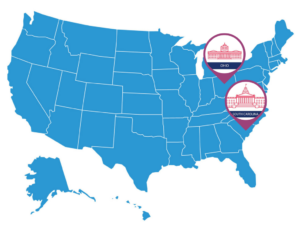
As lawmakers continue to debate how to make online sales tax feasible for the whole country, the issue of nexus continues to reign supreme for states attempting to increase their revenue from internet retailers. The latest in nexus news comes out of Ohio and South Carolina, two states that recently released details about how nexus is defined in their states.
Ohio’s Statutory Changes to Nexus
Earlier this month the Ohio Department of Taxation released statutory changes that broaden how the state defines “substantial nexus,” which means out-of-state retailers could be held responsible for the state’s sales and use tax.
Similarly to Washington State, which expanded the definition of nexus last fall, Ohio’s update includes click-through and affiliate nexus provisions. As the “Use Tax Information Release” explains, Ohio will now hold retailers responsible for state sales and use taxes if:
- The seller uses a place of business within state lines
- The seller uses employees or other agents (such as independent contractors) to conduct its business, or that use its trademarks, trade names or industry classification
- The seller uses anyone to serve Ohio customers in the following ways:
- Receive/process orders
- Promote/advertise
- Make sales
- Conduct maintenance
- Deliver items
- Install services on the seller’s behalf
- Hold items for Ohio customers to pick up items sold by the seller
- The sellers pay at least one Ohio resident to send them business (think affiliate marketing, for example) if the referred customers spend $10,000 with the seller during the preceding year (this is also referred to as “click through” legislation, currently active in many other states)
In the release, Ohio’s Department of Taxation also provided definitions, examples and commentary on what types of activities may create nexus, and how businesses can navigate the state’s tax law.
South Carolina’s Update on Nexus
South Carolina also recently clarified ways that businesses may be creating nexus in their state. While the list is quite lengthy, here are a few activities worth noting:
- Cloud computing or software as a service (SaaS) transactions
- Internet-based activities
- Licensing intangibles
- Various sales and non-sales related employee activities
- Financial activities and transactions
As you can tell, we are watching for news about nexus and the online sales tax closely. In addition to it affecting many of our clients at Miles Consulting Group, it’ll be interesting to see whether Congress will finally come up with a solution that provides states with the additional revenue without making the sales and use tax laws even more confusing for internet retailers. I’ll continue to post news here as well as on LinkedIn; connect with me to continue to see my thoughts on the latest headlines!
Miles Consulting Group, Inc. is a professional service firm in San Jose, California specializing in multi-state tax solutions. Our firm addresses state and local tax issues for our clients, including general state tax consulting, nexus reviews, tax credit and tax incentive maximization, income tax and sales/use tax planning and other special projects. To learn more, contact us today at www.MilesConsultingGroup.com.



















